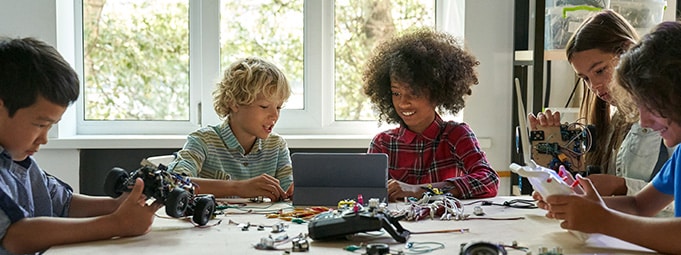
Artificial Intelligence is rapidly becoming synonymous with work and life. That comes with the question of how to start preparing for the growing need for learning AI skills. The best answer might be STEAM education. STEAM equips students with the technical skills needed for the evolving workplace.
Carnegie Mellon University’s Professor of Research, Dave Touretzky states, “It’s important that children be given accurate information about AI to understand the technology that is reshaping our lives.” As the workplace evolves and algorithms become more common, there will be an influx of jobs that require skills and knowledge in AI.
There are plenty of industries looking for professionals that possess artificial intelligence skills, which range from data analysis to programming language, and more. For example, the automotive industry predicts that more than 33 million self-driving cars will be on the road by 2040. This surplus of self-driving cars will increase the demand for AI experts.
The healthcare industry will also be searching for individuals with artificial intelligence skills. This is because AI technology can identify problems much more quickly than humans. Algorithms make things easier, but it’s up to humans to develop and perfect them through machine learning. STEAM curriculums give students the ideal opportunity to hone in on these skills.
A well-rounded STEAM curriculum can also develop computational thinking, a cornerstone of computer science. This way of thinking can help students with problem-solving in a structured and logical manner. STEAM also helps students with techniques such as backtracking, pipelining, and heuristics. Including Artificial intelligence in the STEAM curriculum also drives the modernization of science, mirroring modern scientific practices.
However, there are difficulties behind teaching AI, particularly how time-consuming it is. Another hurdle is the pedagogical approaches to teaching AI. After all, this is still in its infancy. We are only beginning to understand the skills necessary for instructors to teach AI. Luckily, tools like ISTE’s AI Explorations Network and Microsoft Education Center offer courses and hands-on projects that facilitate students in learning AI.
No matter what profession our students decide to pursue in the future, it will no doubt entwine with technology. That’s why they’ll need a comprehensive set of technical skills to be ready for whatever change occurs.
Preparing children with these skills begins by understanding what artificial intelligence is, how it’s applicable in everyday life, how it’s making an impact in today’s world, and what are some of the concerns behind it.
Furthermore, to fully equip students with these skills, there needs to be a space for students to explore, develop, and interact with artificial intelligence. That’s why a STEAM-focused curriculum can do wonders for students learning AI.
Teaching AI is nothing new for Renton Prep. Our Executive Director, Dr. Michelle Zimmerman, has encouraged teaching AI for years and has highlighted the importance of it in her publications. In her book, “Teaching AI: Exploring New Frontiers for Learning” Dr. Zimmerman explains how AI can support and expand student learning through differentiated instruction. Her discussions on this topic have garnered attention from around the world and earned her many awards. In fact, her book has already been translated into 3 different languages.
Renton Prep is proud to provide a technologically driven learning environment. As a Microsoft Showcase School, we strive to create the best possible opportunity for our students through the enhancements of our STEAM curriculum. Our staff comprises proud Certified Microsoft Innovative Educators who constantly seek to improve the education experience through new and exciting ways of teaching.
Don’t hesitate to contact us today if you have any questions about our STEAM curriculum. We’d love to hear from you!